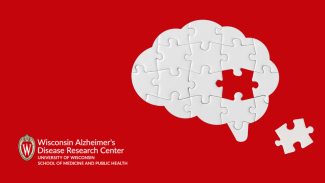
Lifestyle and chronic health conditions in middle age, along with a person’s education level, show associations with emerging blood markers of neurodegeneration and Alzheimer's disease, according to a new study by researchers at the University of Wisconsin School of Medicine and Public Health.
The research team led by Natascha Merten, assistant professor of population health sciences and medicine, UW School of Medicine and Public Health, examined the extent that education, lifestyle factors and vascular and metabolic health in midlife were associated with the long-term increase in the blood levels of three pathological proteins associated with Alzheimer’s disease and/or neurodegeneration: amyloid beta, tau, and neurofilament light chain protein.
“Our primary goal was to understand the extent to which education, midlife health and lifestyle factors correlate with long-term increases in blood biomarkers associated with neurodegeneration,” said Merten, who has a doctorate in epidemiology. “Studying changes in midlife, when most participants are still cognitively healthy, allows us to identify individuals at risk for neurodegenerative diseases early, which could help to initiate future interventions early in the disease process as well.”
The study was published in the August edition of the Journal of Alzheimer’s Disease.
Identifying factors that may contribute to or prevent the development of disease might inform future, more efficient prevention strategies, she added.
The study used data and blood samples from participants of the Beaver Dam Offspring Study, a longitudinal investigation of sensory and cognitive aging initiated in 2005 in Beaver Dam, Wis. Participants were 50 years old on average at the onset of the study. The researchers measured blood markers associated with neurodegeneration and Alzheimer’s disease in stored samples from approximately 1,500 participants. The researchers also assessed various lifestyle and health factors including education, smoking habits, alcohol consumption, level of exercise, body mass index, blood pressure, cholesterol levels, diabetes and inflammation markers.
The results showed that education and inflammation markers were correlated with blood biomarkers for neurodegeneration and Alzheimer’s disease. Having more years of education was associated with lower levels of biomarker proteins and/or a slower rate of increase over time, supporting the idea of education as a potential resilience factor. Conversely, participants with elevated levels of inflammation markers in their blood experienced higher levels and/or faster increases in neurodegeneration and Alzheimer’s markers.
Of particular interest to Merten and her team was the connection between the levels of neurofilament light chain, which is indicative of general neurodegeneration, and lifestyle and health factors. Participants who did not engage in regular exercise exhibited faster increases in neurofilament light chain protein over the course of a decade.
Additionally, individuals with cardiovascular conditions, high blood pressure, atherosclerosis or diabetes had faster increases in neurofilament light chain protein over time. Elevated inflammation markers also correlated with more rapid increases in these blood biomarker levels.
If confirmed by more studies, Merten’s findings of the association of more education and having a healthier lifestyle and better health conditions with showing slower neurodegeneration over time could be relevant for future targeted treatment or intervention methods.
“Ongoing research is essential to understand the potential prognostic value of these biomarkers to detect neurodegeneration and dementia,” she said. “Longitudinal studies following individuals from midlife to late-life, when some individuals will develop impairments while others will not, will be crucial in discerning the relationship between these biomarkers and cognitive decline or dementia development.”
Merten’s research group has started the 18-year follow up of the original Beaver Dam Offspring Study, called the Beaver Dam Offspring Study-Neurocognitive Aging Study. With this continuation, the researchers aim to contribute to the identification of early markers and potentially modifiable factors to promote healthy brain aging.
“We would like to thank all our participants for their continuing participation and support,” Merten said.
The study was supported by RF1AG066837, R01AG021917, and R01AG079289 from the National Institute on Aging and by an unrestricted grant from Research to Prevent Blindness to the Department of Ophthalmology and Visual Sciences at the University of Wisconsin–Madison.
For media inquiries contact: Jessie Geraci-Perez, 608-220-1514



